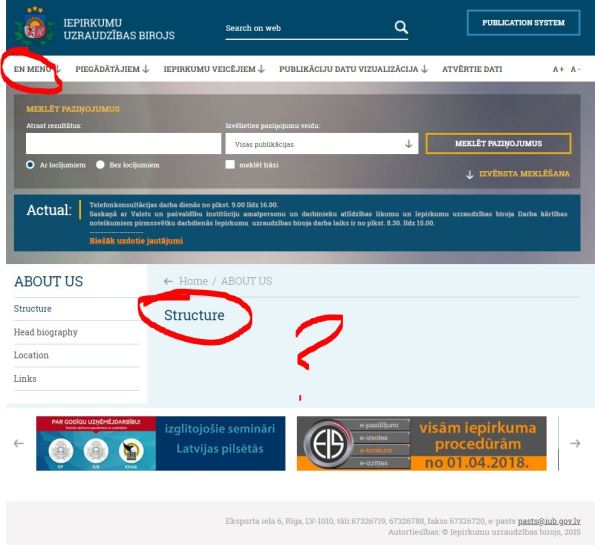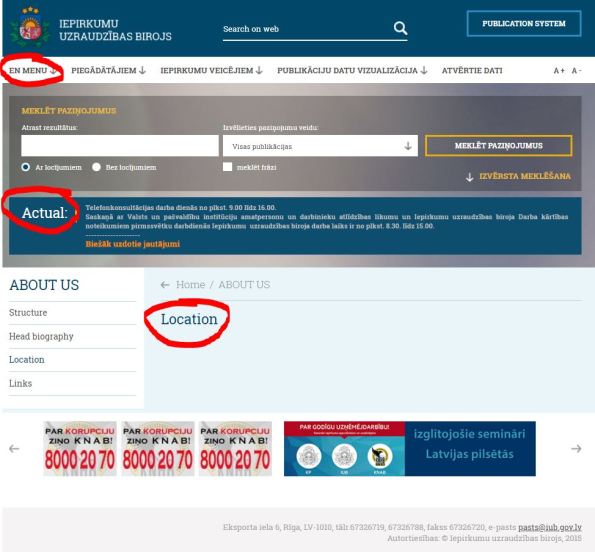Truth about Latvia #3: The failure of “Procurement Monitoring Bureau” & corruption.
Each civilized country these days operate some sort of institution monitoring procurements and fighting corrupt procurement practices and violations.
In small, failed Eastern European state of Latvia this institution is called “Iepirkumu Uzraudzības Birojs” or in direct translation to English it would sound something like “Procurement Monitoring Bureau”.

In a country where corruption, arrogance and negligence goes hand in hand with self-proclaimed success you might suspect that something is wrong in institution like this…
So what could happen if someone decides to investigate and test this institutions professionalism… and honesty…?
First of all… let’s have a look at their website.
Someone got paid to design – build their website, unfortunately as it often happens in corrupt organizations the end result was a bit crooked… for example this Latvian institution apparently paid for the English language version of their website, but emm… they knew only few words in this alien language so they ended up with hybrid – Latvian English website version… quality…

Another hint we might give to Latvian IT professionals would be… emm… maybe you should at least attempt to write something… at least something under the categories you make on government website… instead of leaving such primitive parts an “Structure” and “Location” empty…

OK – people do IT government contracts, but don’t speak English and don’t have common sense – nothing new for Latvia…
However – lack of English language on website with government procurements and private procurements within a specific country very well works as a tool to prevent information of leaving the country…
Potential participants in local tenders from outside world will not be able to see the tenders taking place and also will not be able to fight against corrupt tenders… makes sense not to have English version finished… for decades… but paid for…
So, let’s get back to our investigation into corruption, or in mild terms lack of willingness to respond on potential corruption reports…
How the system works?
A Company – legal entity, want to buy equipment.
The Company either approach suppliers – manufacturers, or know who they want to buy the equipment from, they just have to get their project through procurement process.
Usually during procurement process, if EU or government funding is involved, buyer have to prove he has been looking into multiple suppliers – show multiple offers.
Goals for the buyer?
For the buyer who want to get EU or government funding in addition to his financial resources it is beneficial to get the best deal, not necessary the best equipment and not necessarily the right machinery – as long as everybody makes their money.
Possible problems?
For buyer to get funding approved it is important to get multiple offers on the table, but in the same time it is also critical to get his “friends” offer to win the tender.
This can be done in multiple ways – by late requests, fabricated offers and many other manipulations.
The purpose of “Procurement Monitoring Bureau” is to prevent such scams from happening.
On the other side of the table we have sellers of the equipment.
Either direct manufacturers of the equipment – machinery – product or local dealers, distributors, resellers.
The sellers, if they are experienced enough can easily notice situations when buyer is approaching them only to get some info, just about enough to put some sort of alternative offer on the table in front of “Procurement Monitoring Bureau” – just so he have the number of offers to get the project through…
So what options sellers have at this point?
Sellers can:
– play by the buyers rules (“bribes and games”)
– fight for the tender (try to convince their offer is much better…)
– report potential scam to relevant institution
Lets pretend that this tender is not financially interesting for our potential seller and he decides to report possible fraud.
So this is where our test begins.
During e-mail transmissions between seller and buyer “Procurement Monitoring Bureau” of Latvia is attached as Bcc (Blind Carbon Copy)
What should happen next?
Government institution responsible for fair procurements etc should notice this e-mail, read it and start investigation – we are not even going to bother saying they should be thankful…
But what happens in Latvia?

Well… basically company who reports possible indication of planned scam get told by Latvian “Procurement Monitoring Bureau” or “IUB”: “Go F*** Yourselves… !!!”
OK, in direct translation: “We have not sent you any inquiry abut XXXXX equipment and we are not planning to send you any inquiry. We are serious institution, so please do not send us your correspondence” Basically the same thing as GFY.
This is how far you can get if you practice “soft corruption” for 30 years.
Case Closed.
Fun Facts.
- Director of Latvian “Procurement Monitoring Bureau” or “IUB” – Dace Gaile, in 2017 earned 33% more than in 2016.
- Salary in 2016 for the Director of Latvian “Procurement Monitoring Bureau” or “IUB” – Dace Gaile, was approx. 45 000 Eur per annum.
- Salary in 2017 for the Director of Latvian “Procurement Monitoring Bureau” or “IUB” – Dace Gaile, was approx. 61 000 Eur per annum.
- National Minimum Wage – Minimum Salary per month in Latvia, before taxes are deducted, in 2017, was 380 Eur per month (increased to 430 in 2018)
- The average gross wages and salaries in Latvia, in 2017, was around 880 – 900 Eur per month before taxes are deducted.
Bonus Case.
How LATVIAN SECURITY POLICE organise their procurements for non classified, non strategic equipment?
- Regular items – equipment which has no significance to secret operations is classified as it would be such – special equipment. (for example computers, printers, etc…)
- “In-House” courier with procurement details is sent to targeted suppliers chosen based on their field of operation and cleanliness in tax returns, not professionalism, not expertise… (of course – unless it’s just a matter of buying from a friend…)
- Upon receiving letter in hands handed to the potential seller by “In-House” courier the person receiving this document is requested to sign nondisclosure agreement – in other words – before you can take this letter you have to sign that you will not tell anyone whats inside it…
- The technical specification of the item in procurement is incorrect – with mistakes and physically impossible requirements in some cases, but incompetence of the person in charge of procurement is not to be exposed due to agreement signed upon receiving the letter…
Now, this is how you “PRO” “soft corruption…” …